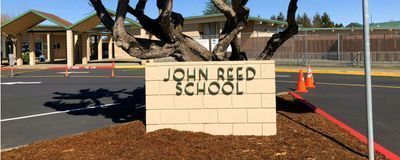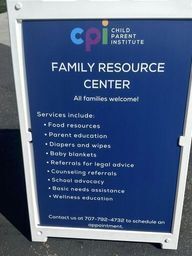
John Reed Elementary Family Resource Center Overview
The community of Rohnert Park experienced dramatic growth, change and challenges over the past decade resulting in much need and few resources. Expanding the capacity of prevention partners and family strengthening services to support the safety and well-being of families and children in Rohnert Park is critical. To that end, the Cotati-Rohnert Park Unified School District (CRPUSD) created a model to support families with basic needs, parent education and mental health resources through the development of a Family Resource Center in one of the highest needs neighborhoods in the district.
Background and Need: CRPUSD Superintendent, has been an outspoken advocate regarding the needs of the district as well as the understanding of what a Family Resource Center can provide for students and their families. They helped shape the vision for establishing a Family Resource Center at John Reed Elementary in partnership with Child Parent Institute (CPI) to ensure that families have the resources and support they need to ensure a safe and healthy home environment. They saw the critical need to provide an inviting, warm environment where parents can feel comfortable and confident in taking an active part in the school and the life of their child. By working together, the John Reed Family Resource Center and the school can replace educational barriers with bridges of opportunity and success.
Annamaria Young, Principal of John Reed Elementary, confirmed the need for additional resources at her school, “John Reed is a unique, vibrant, and community-based school with substantial needs identified in the area of parent classes in English and Spanish, access to basic needs, technology education, and medical interventions to support the well-being of our community. Our community has been significantly affected by the Covid pandemic and its aftermath. The community is in desperate need of social-emotional interventions, and resources for housing and access to promising employment.”
While working to identify students and families in need, the district recognized it is important to be prepared to provide key family strengthening services. When asked to describe gaps and barriers for students and families, both the principal and staff at John Reed Elementary provided this list:
- Medical: need for glasses, dental services, would appreciate hosting clinics
- Nutrition: students come to school hungry and snack time is at 10am, low blood sugar
- Financial challenges
- Lack of transportation, assistance with navigating public transportation
- Technology divide: virtual meetings are on phones rather than on a device
- Drug/alcohol abuse in the family: students have an awareness at very young age
- Language barrier: English classes for parents needed, newcomers struggling to find employment
- Parent Education Classes
- Bilingual support
- Parent Leadership Training
- Extracurricular, sports
- Need for a warm welcoming setting to access support services ...like a family resource center!
The Family Resource Center: A Trauma-Informed Community Approach to Homeless Innovation

To address these critical needs of John Reed students and families, the CRPUSD partnered with CPI – a highly regarded nonprofit helping lead child abuse prevention in Sonoma County for more than two decades – to implement a Family Resource Center rooted in the Strengthening Families Framework.
Understanding the prevalence and impact of homelessness is central to providing effective support for students and families experiencing it. Annually, one in 10 young adults ages 18-25 and one in 30 youth ages 13-17 experience some form of homelessness. Experiences of psychological trauma (e.g., abuse, neglect, violence, or sexual victimization) are often a common reality for youth who have experienced homelessness. In addition, once they become homeless, many young people become re-traumatized.
Within nearly every story of trauma is a social component that needs to be addressed. Ecological models of trauma and recovery that focus on resilience, empowerment, and social change may have a much better chance at addressing not only individual aspects of trauma but also community and societal contributors to trauma.
Although family and peer support act as protective factors to youth exposed to community violence, exposure to community violence can still create distress and academic challenges for exposed youth. It is therefore essential to meet youth experiencing homelessness with a trauma-informed approach where helpers realize the widespread impact of trauma and understand potential paths for recovery, recognizes the signs and symptoms of trauma in clients, families, staff, and others involved with the system, respond by fully integrating knowledge about trauma into policies, procedures, practices, and settings, and seeks to actively resist re-traumatizing the youth and their families.
Teams that are supporting traumatized youth experiencing homelessness need active and ongoing support to provide optimal care beginning with education, training, and ongoing support. These teams also need a cohesive framework for understanding how trauma and Adverse Childhood Experiences (ACEs) affect children, youth , and families in order to better serve homeless youth in need. Trauma can have a powerful impact on youth experiencing homelessness, and without a trauma-informed care approach, youth can become re-traumatized, providers can struggle to establish trust and rapport with younger clients, and youth can feel misunderstood, guilty, and discouraged.
To address the complexities associated with traumatized homeless youth, CPI employs the following training programs suitable for school personnel, community partners, volunteers, and anyone supporting the work of the school-based Family Resource Center:
Supporting the Distressed Child/Youth in Schools - This training highlights the challenges traumatized and distressed children or youth encounter in school and how helpers can identify signs of trauma and respond in age-appropriate ways to support the child/youth. We address how a shared trauma-informed approach supports everyone on the team including the youth and their caregivers. Click here to download training PowerPoint.
Self-Care for Helpers - Providing care to youth experiencing homelessness carries significant occupational hazards: Vicarious Traumatization, Compassion Fatigue, Secondary Traumatic Stress, and Burnout. The Professional Quality of Life measure (ProQOL) is a useful tool for measuring these factors is available free and online. This tool can help assess teams and formulate plans to anticipate, protect, and address the impact of work on helpers. By working on individual and organizational wellness plans, teams can ensure that self-care is prioritized and seen as a value.


